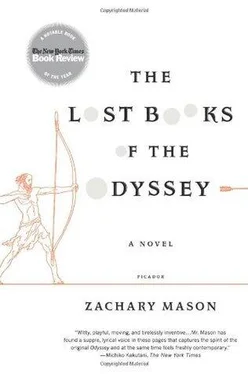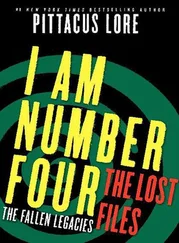I woke to blood and agony and darkness. Staggering to my feet, I lashed out and felt my fist connect with resilient flesh. I put my hands around the spear with which I had been mutilated; vitreous humor trickled down my face and I knew with nauseous certainty that I would never see again. I drew out the spear and lay about with it, feeling their bones crack through the shaft. I bellowed and pressed the attack, not caring if I blundered into an outstretched sword. Commotion, hoarse panicked voices and motion in every direction. With mortal intent I made a mighty thrust toward the closest whisper but struck the wall — the spear broke in two and I was left holding a fragment of the haft, just big enough for a torch. I stopped and listened — it was silent but for my heart and my breathing. They had gone.
I put my hands to my ruined face, then bound the wound as best I could and staggered down the steep path to the sea. I thought I heard their oars on the water and raged at them, wading out into the surf, flailing at the waves, finding stones by touch and hurling them. I might have heard Nobody’s voice but with the breakers and my shouting I could not be sure.
They were gone and I got cold. I was not quite brave enough to drown myself. I shouted for my father — I did not love him much but he knew his duty and I thought he would avenge me. If he heard me, he gave no sign. I crept back to my cave and the pain, which had been waiting at a distance, engulfed me.
Fever came. I lay by the fire, chilled to the bone, too weak even to go to the well. At first the fever was low and I was transcendently calm and thought I had at last found true philosophy. As the fever rose and rose I started to shake uncontrollably. A young man with golden hair appeared, standing patiently in the shadows, watching me, leaning on a staff around which snakes twined (of course, if there had been such a man, I would not have seen him). In the dream, as the pain deepened he came more and more into the light and I thought he would speak to me but just then my father arrived and sent him away. He laid his vast hand on my forehead, as cool as the deeps of the sea, and I told him that it was Nobody who did this to me and must die.
The fever broke soon after that and I lay awake and alone in my cave, facing a future of darkness. I groped in the dust and found cheeses, my staff, a bucket, the empty wineskin, the cold ashes of the fire, a pile of furs, and the sharp end of the spear that had blinded me, still sticky with dried blood and matter. I sat down and I think I would not have got up again if not for my goats, who butted their heads against me and clamored to be milked. This I managed to do, and then shooed them off to their pasture and laid out their salt while they bleated and had their little quarrels.
The days were long and there was no sun to dazzle me. I wondered incessantly about the man who had brought me a sack of wine, a tale and blindness. In my mind I replayed everything he had said, trying to reconstruct each tone and nuance. He had not uttered a single true word, of course, but we are revealed in our lies. His and his men’s clothes had been thrice-patched stuff but their helmets and arms were keen edged and mirror polished. They had carried their arms with a total casualness, their weapons extensions of themselves, like veterans old in war. They had accents, the like of which I had never heard before, so I reckoned Nobody and his men must be from far away, out toward the edge of the world.
My hatred of Nobody was impotent and all-encompassing. I wanted to be free of it, but always my mind went back to him. I told myself and the goats stories about him — one day he and his men were pirates from Corsica, vicious raiders out to prey on anyone they could overwhelm or surprise. The next they were a party of pilgrims bound for Delphi who had stopped on my island for water and found me only through misfortune. But their ragged clothes and gleaming weapons, their hardness and loneliness and hunger made me decide in the end that they were coming back from a long, bloody war, fought far from home, a war that left them with eyes as blank and hostile as birds of prey, raiding and killing as the opportunity arose, knowing no life but arms and no law but violence.
I invented perils for his trip home — horrors rising up from the deep sea, the endless asphodel fields of the dead, sweetly singing witches to gull and bind him — but I could never quite bring myself to finally close the sea over his head or the jaws on his throat. Always I pulled him back, unwilling to let him escape into death. As his trials mounted (all of which scarred him, took some vital piece of him — I needed him alive, not whole), I saw that he must have some good reason to go on living, for, as I have often reflected, it is a simple thing to give oneself up to the sea. So I gave him an island like mine, not good for much but raising goats and men, and a wife of perfect steadfastness (the mirror image of the woman I knew so long ago).
I invented perils for his trip home — horrors rising up from the deep sea, the endless asphodel fields of the dead, sweetly singing witches to gull and bind him — but I could never quite bring myself to finally close the sea over his head or the jaws on his throat. Always I pulled him back, unwilling to let him escape into death. As his trials mounted (all of which scarred him, took some vital piece of him — I needed him alive, not whole), I saw that he must have some good reason to go on living, for, as I have often reflected, it is a simple thing to give oneself up to the sea. So I gave him an island like mine, not good for much but raising goats and men, and a wife of perfect steadfastness (the mirror image of the woman I knew so long ago).
In retrospect, it is obvious that “Nobody” was a nom de guerre , the alias of an anonymous raider. The choice of sobriquet suggests a man infatuated with his own cleverness. He carried himself like a warrior, but preferred getting me drunk to attacking me openly. His mind, I thought, must be like a city of a thousand twists and turns, founded on deceit, with never an open line of sight or a straight passage. Fluent in lies, he must have been the death of many men greater than himself. And he was loyal to his men, or so I liked to think, as it increased my pleasure in making monsters pluck them from his ships while he stood by helplessly, and in making their ghosts weep for burial.
The island farmers are less timid now that I am blind. They bring me fruit and salted meat and listen with more than polite interest while I tell my stories. Some parts of the tale have gelled over the years, though others I improvise or vary as suits the audience’s mood or mine — even now it gives me pleasure to invent new sufferings for him. For all that, my bloodthirstiness has lessened — I no longer groan in my sleep or dream of catching him and wrenching out his bones. The ruin where my eye was is not painful anymore, and my days are calm, even joyful. Sometimes I think I am grateful, that sight would be a distraction.
In his sojourn in the land of the dead Odysseus saw Penelope among the listless shades. With his broadsword he cleared a path through the muttering ghosts but she receded, seeming not to see him. He called out her name and chased after her, leaving his men behind, catching up with her in a dark glade full of asphodel where she sat at a loom weaving a long shroud. He made to speak to her but, remembering the ways of the dead, used his sword to dig a small pit over which he opened a vein.
She was drawn to the blood and drank, something like light coming into her eyes. “It is no kindness to bring the dead back to themselves. We are wretched but do not know it until you remind us. Why have you come to trouble me, stranger?” she said, looking up from where she knelt in the dust with red streaks on her white face.
Читать дальше












